Responsible Travel Writing for Travel Media
Travel writing can be problematic.
You are the solution.

You collect stories and experiences, can never quite remember what time zone you’re in, and always have your passport within arm’s reach.
As a travel writer, you have that dream job that everyone wants.
You’ve been fortunate enough to visit some of the farthest corners of the world, but you’ve also seen the dark side of the industry: overcrowding, erasure of local communities, environmental destruction, depletion of natural resources, wildlife exploitation, white saviorism, cultural degradation, and gentrification.
As an influential conduit between travelers and the destinations they visit, travel writing has contributed to and accelerated many of these problems.
But in the right hands, it can also empower people, support community wellbeing, and help heal the natural environment.
Travel writing can be destructive, but you don’t have to be.
Join this self-paced program to build and refine your skills as an ethically focused writer. Feel 100% confident you aren’t causing harm while pursuing a job you love. By the time you complete this course, you will:
- Know how to use your professional skills to create a positive impact. Recognize and exert your powerful influence in the tourism industry to minimize environmental damage and support sustainable development.
- Understand your role in decolonizing travel writing. Ensure that your work contributes to a more equitable and safer world.
- Feel re-energized and inspired to write about travel topics in a fresh and responsible way. Move beyond the articles that pay the bills but leave you feeling empty.
- Be confident that your work makes a difference in a world facing a multitude of challenges. Know you’ve acted ethically as a writer, traveler, and global citizen, and know for sure that your writing encourages readers to do the same.
HOW CAN THIS COURSE help yOU?
In this self-paced course, you will learn:
Why current and popular travel writing choices encourage people to engage in dangerous and destructive behavior.
How language choice and article structure can cause harm or, alternatively, be used to empower and educate readers.
How to recognize and acknowledge your personal biases in your writing — and how to use it to your advantage.
The role perspective and subjectivity play in shaping travel content.
How to navigate travel writing ethics related to press trips.
Why responsible travel writing is essential for addressing the climate crisis and supporting global sustainable development.
The connection between travel trends and problematic terminology.
Where and how to find diverse sources that provide more nuanced insights beyond the dominant narrative.
How a history of colonization impacts travel writing, and what you can do to mitigate its damage.
Best practices for responsibly writing about people and places as an outsider.
Best practices for working with editors on sensitive subjects.
New ways to approach travel writing so that you — and your readers — become part of the solution rather than part of the problem.
Time is of the essence.
Spoiler alert: Your dream job is incredibly important.
Travel is on the brink of a pivotal moment. For years, the tourism industry turned a blind eye to destructive travel activities and practices. And for years, travel writers have been complicit in supporting and promoting this harmful model.
You are an essential link between potential travelers and the places they travel.
As a travel writer, you have a monumental decision to make today:
Churn out content that
“gets the job done.”
OR
Intentionally pursue and develop work that positively impacts local people, regenerates the environment, and sustainably supports your life.
This course is designed for:

› NEW WRITERS
New travel writers who want to learn about the common pitfalls that lead to lazy — and possibly — destructive writing.

›› established wrITERS
Seasoned travel writers who want to understand the nuances of the words and article structures they commonly fall back on — and how to change those habits.

››› Editors
Editors who want to understand how to work with writers to source more thoughtful stories and encourage readers to become better travelers.

›››› travel bloggers
Travel bloggers who want to use their personal platforms to tell more responsible, meaningful stories.
This course may not be for you if:
What this course includes:
Here’s a sneak peek of what you’ll learn in the course:
Welcome to Responsible Travel Writing for Travel Media! Get an overview of what this course covers, download your workbook, and let’s dive in!
Travel writers play an essential role in the tourism industry. They should have a solid understanding of how and why the tourism industry operates because this reflects upon the experiences travel writers have and share with others. This brief overview offers insights on the relationship between tourism and colonialism, tourism’s positive and negative impacts on destinations and people, and how travel trends affect traveler decisions.
Responsible travel content creation plays a big role in the tourism industry’s efforts to promote a safer, more equitable, and more sustainable tourism model. For this to happen, content creators must be able to recognize how tourism, and, by extension, travel writing, have caused harm in the past so they can correct these problems in the future.
There’s more to successful, responsible travel writing than just showing up for an assignment. Preparation is as important as the actual writing itself. This means travel writers must think in advance about how to visit a destination, who to seek out, what questions to ask, and how to manage privilege.
Places are unique in large part because of the people who live there and who have shaped a place’s culture and story over time. It is important to consider their perspectives and points of view in developing travel content, and writers must avoid extracting and exploiting others’ stories for personal satisfaction and professional gain. Learning how to appropriately incorporate people into storytelling while averting harm is at the heart of responsible travel writing.
Ultimately, travel writers must choose words in order to share their stories with readers. The impact of these language and terminology choices is significant, but, unfortunately, there isn’t an easy checklist of words to use and avoid. Content creators must learn to think critically about what they want readers to understand, believe, and feel, and evaluate the consequences of choosing certain words over others.
Though travel writers might be familiar with topical tourism issues and common buzzwords, not all readers will be. Writers must consider how they approach these topics and meet readers where they are while avoiding potential confusion or harm. This module uses several examples to illustrate better practices for approaching trends and tactics used in travel-related writing.
Beyond the actual words travel writers choose, they must be mindful about how their articles are formatted and presented as a package for prospective readers. Making content choices that intentionally and responsibly present their stories bolsters readers’ ability to appropriately prepare for the places they’ll visit and the people they’ll meet. Conversely, failing to consider content choices like headlines and imagery can undermine the integrity of an entire article.
As travel writers begin their journey toward more responsible journalistic practices, they’ll need to navigate commonly assigned but problematic article formats. This is an opportunity to find new ways to approach travel content creation while remaining aware of potential areas of concern. Doing so boosts writers’ confidence for taking on challenging topics, expands their professional toolkit, and opens the door to new kinds of assignments.
The travel content creation space is ripe with ethical quandaries. Responsible writers need to learn how to navigate these sticky situations so they don’t mislead readers or misrepresent the places and people about which they write. Among their greatest allies in this area are their editors, who serve as gatekeepers to the final published articles.
All travel writers are also citizens of Planet Earth. As visible and influential members of society, their responsibility doesn’t end when an article is published. In our increasingly interconnected world, travel writers must consider how their behavior and content align with each other — and whether their commitment to responsible content creation is performative or genuine.
Social media plays an increasingly important role in the way people perceive the world and the decisions they make. Though indirectly tied to travel writing, social media’s role in content creation and dissemination is vital to understand — especially because it is a (mostly) self-controlled environment. If travel writers are active on social media, they should keep several things in mind on their journey to becoming more responsible and intentional in their work.
Get the Course
Our three-tiered pricing is based on the World Bank’s Country and Lending Group data.
Please select the pricing structure that's most relevant to your situation.
Learn more about Rooted’s tiered pricing structure.
High-income economy price
Middle-income economy price
Low-income economy price
14-Day Money Back Guarantee
If, for any reason, you are dissatisfied with the course, you can get a full refund anytime within 14 days after your purchase. If you have any issues, just get in touch with our friendly support team and they'll either help you out until you get the results you need or give you a swift refund.
Meet Your Instructor
JoAnna Haugen
As your instructor, I'm here to support you as you develop your travel writing skills in a more thoughtful way. I will give you the information and tools you need to inspire and educate travelers while minimizing damage to people, the environment, and the destinations you write about.
I am a writer and editor with nearly 1,000 articles published in more than 60 publications including BBC Travel, AFAR, Adventure.com, Wizz Air Magazine, American Way, Sustainable Brands, Fast Company, and Backpacker. I wrote a travel column for the Orange County Register for many years, have updated guidebooks, and worked as an editor for TravelWeekly and AdventureTravelNews.
I am also the founder of Rooted, a solutions platform that helps tourism professionals decolonize travel experiences and support sustainability through ethical marketing and strategic storytelling.
Just a Few of the Companies I've Worked With:
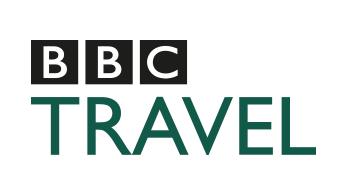

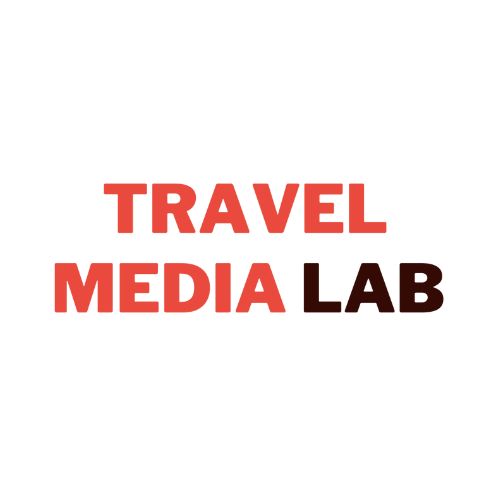


WHAT People HAVE TO SAY ABOUT THE COURSE
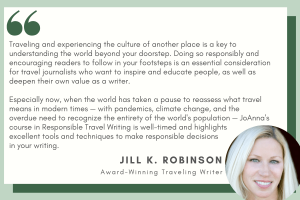
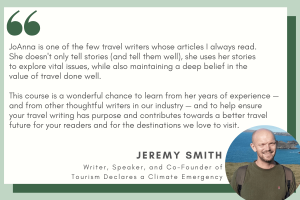
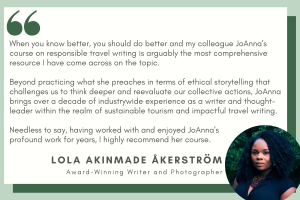
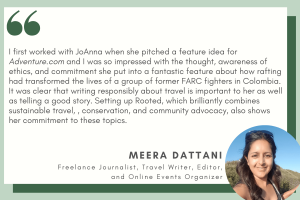
Frequently asked questions
You are free to start and end this course on your own time. You can complete the modules in any order at any pace comfortable to you. You have one year to complete the course, so you can revisit content at any time.
Because it is self-paced, there is no direct interaction with the instructor or other students.
Yes! It is never too early to understand the details of the industry you work in. This is the perfect time to put good habits into place so that you can confidently develop relationships with editors, produce ethical travel-related content, and advance your career as a travel writer.
Absolutely! You’ve likely bumped into some of the problematic aspects of travel writing already, but there is always more to learn. This course provides background information on why the travel writing sector functions the way it does, and then will help you identify, better understand, and correct some of the bad habits you may have picked up during the course of your career as a result. You already yield a lot of influence — now you can confidently know your work is maximizing good and minimizing harm.
